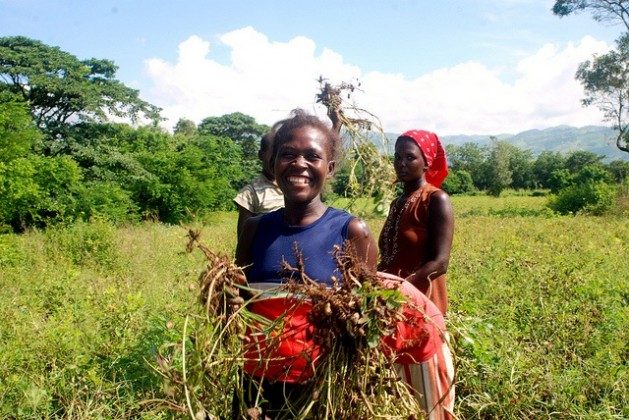The Caribbean’s Role in the Transformation of Agri-Food Systems

SANTIAGO, Mar 09 (IPS) - The global food security crisis reveals an increase in the undernourishment prevalence, reaching higher than in 2015, when countries first agreed to eradicate hunger by 2030 as one of the SDG targets. In the Caribbean, between 2014 and 2021, hunger increased by 2.3 percentage points, affecting 16.4 percent of its population by 2021. Moreover, the Caribbean is a net importer of almost all the main food groups such as cereals, dairy products, fruits and vegetables (except the Dominican Republic), meat and vegetable oils.
This region is highly vulnerable to extreme events, climate variability and climate change. Increasingly extreme weather events, shifting rainfall patterns, rising temperatures, recurrent drought, and floods, among others, pose an unprecedented threat that can cause substantial socio-economic and environmental loss and damage.
The recent Forty-Fourth Regular Meeting of the Conference of Heads of Government of the Caribbean Community (CARICOM), chaired by the Bahamas, highlighted some of the main challenges affecting food production in the region. The Food and Agriculture Organization of the United Nations (FAO) has strengthened a special focus to implement joint strategies to support the Caribbean countries’ priorities and discuss new ways for the Caribbean to transform agri-food systems.
For the first time, FAO was invited to address this important discussion during the 17th Special Session of the CARICOM Council for Foreign and Community Relations (COFCOR). FAO recognized CARICOM’s great efforts to implement the agri-food systems strategy in member states to help achieve the reduction of the Caribbean's large food imports bill by 25 percent by 2025.
The Organization is supporting the development of priority value chains to contribute to reducing the region’s food import bill. It is doing so by working with governments and key stakeholders in designing and upgrading strategies, as well as good practices and opportunities for attracting investment to help boost intra-regional trade.
In this frame, the Heads of Government of CARICOM have also supported the project proposal “Building Food Security through Innovation, Resilience, Sustainability and Empowerment” presented by Guyana; and FAO is working closely with the Member States to promote a climate finance mobilization strategy to fund innovative initiatives such as novel animal feed, optimizing greenhouses, soil, and land mapping. FAO supports governments and communities in building capacities to comprehensively manage multi-hazard risks to enhance the resilience of livelihoods and value chains.
It is crucial to increase and improve the efficiency and effectiveness of investments across the agri-food system. In this regard, FAO, together with the CARICOM Private Sector Organization, agreed to pursue collaboration to enhance intra-regional trade and private sector investment in the Caribbean to trigger agriculture sector growth.
On the other hand, the last Summit of Heads of State and Government of the Community of Latin American and Caribbean States (CELAC), whose current pro-tempore presidency is held by St. Vincent and Grenadines, concluded with a declaration from 33 member states, which emphasizes a regional commitment to guarantee food security, supporting agricultural and rural development.
This high commitment of the main government structures of the region will contribute to an effective preparation for the next FAO Regional Conference in Georgetown, Guyana, which will take place in March 2024, disclosing the importance of an effective engagement of the Caribbean in the decision-making process to transform the agri-food systems.
The successful transformation of the agri-food systems in the region will require ownership, political commitment, and action plans. It is necessary to coordinate a joint effort to reinforce technical assistance in the field and more investment and partnerships to support food security, climate change fight, sustainable production, and international fair commerce to protect livelihoods and small-scale producers and guarantee our food security.
© Inter Press Service (2023) — All Rights Reserved. Original source: Inter Press Service
Where next?
Browse related news topics:
Read the latest news stories:
- Forest Guards Risking Their Lives To Keep Malawi’s Forests Standing Monday, March 31, 2025
- Global Climate Action Progressing, but Speed and Scale Still Lacking Monday, March 31, 2025
- ‘Student Protests Have Sparked Solidarity, Empathy and a Renewed Belief in Collective Action’ Monday, March 31, 2025
- Southeast Asia’s Economies Can Gain Most by Packaging Ambitious Reforms Monday, March 31, 2025
- Myanmar earthquake: Search and rescue efforts continue in race against time Sunday, March 30, 2025
- Looking beyond GDP to reach the Sustainable Development Goals Saturday, March 29, 2025
- UN chief strongly condemns killing of Kenyan peacekeeper in Central African Republic Saturday, March 29, 2025
- Myanmar quake: More than 1,600 reported killed, as UN aid operation supports rescue efforts Saturday, March 29, 2025
- Water and Food Security in Europe and Central Asia: A Shared Challenge for a Sustainable and Just Future Friday, March 28, 2025
- Latin America & the Caribbean in 2024: Renewable Energy and Early Warning Systems Offer Hope Amid Climate Extremes Friday, March 28, 2025